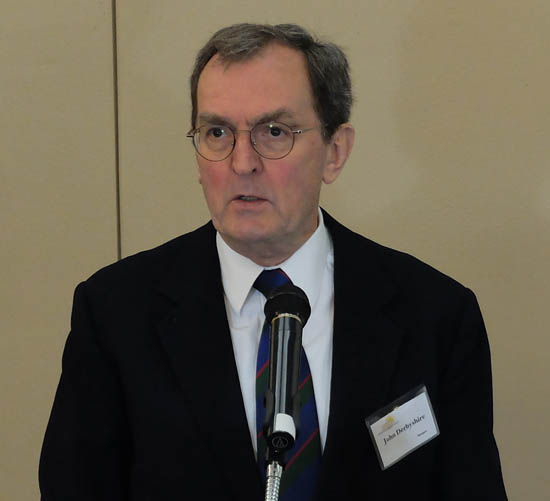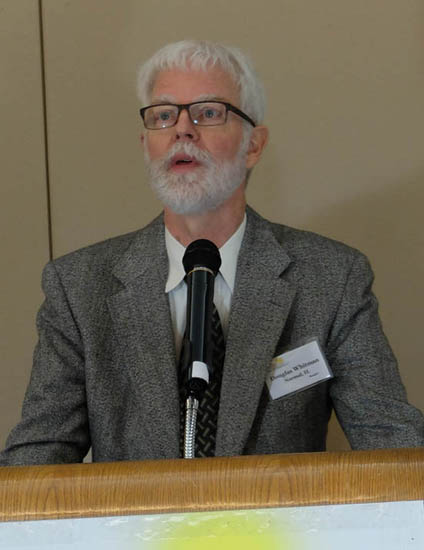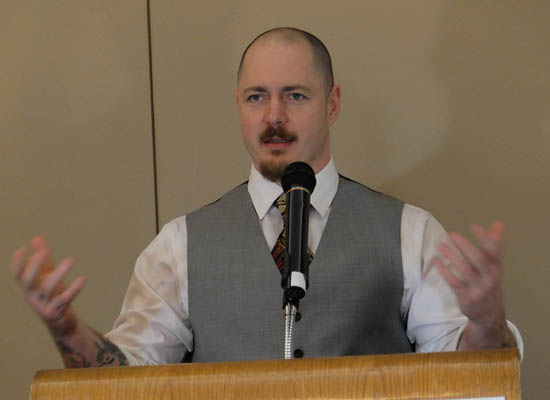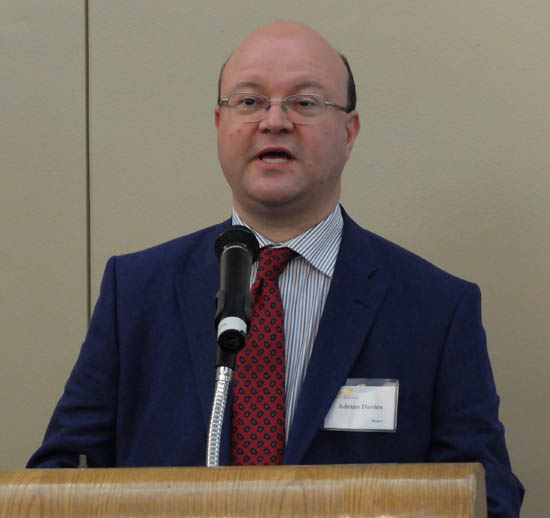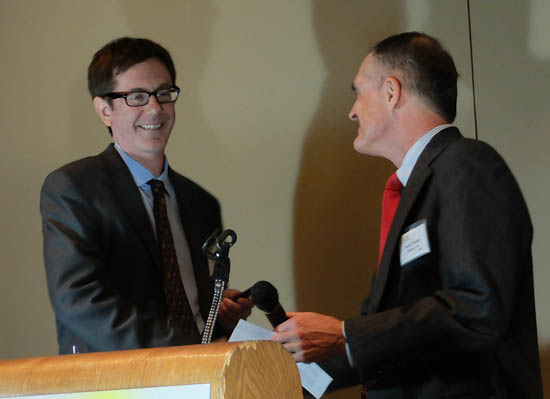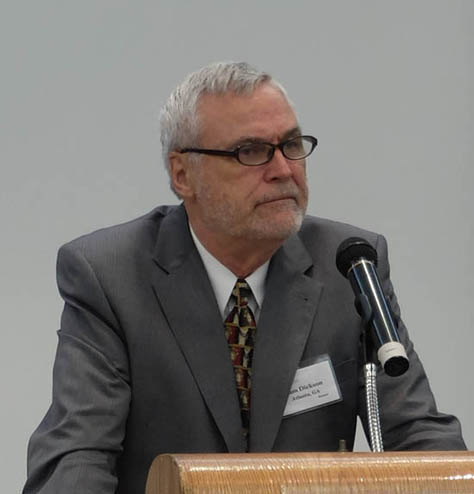2014 American Renaissance Conference
AR Staff, American Renaissance, April 28, 2014
April 26 dawned as a brilliant spring day in Montgomery Bell State Park just outside of Nashville, Tennessee. It was a perfect beginning for the more than 150 people who enjoyed the inspiring talks, fellowship, and conviviality of the 12th American Renaissance Conference. A band of scruffy “anti-racist” protesters was just the seasoning to make it a recipe for a perfect weekend.
The first speaker was columnist, author, and noted China expert, John Derbyshire. His talk was a fascinating introduction to China and its relations with the United States. He first pointed out the remarkable cultural stability China has enjoyed over a history that may be as long as 5,000 years — if one accepts accounts of semi-mythical early eras.
A striking aspect of China’s national character is conformity, which may be a naturally evolved trait or could have been the result of generations of Chinese rulers systematically killing off anyone with a rebellious streak. Mr. Derbyshire explained that many Chinese proverbs praise conformity and fitting in, as in “The tallest tree in the forest is the first to be cut down.”
Mr. Derbyshire described the early period of Chinese immigration to the United States, which brought mostly manual laborers. Their alienness and their willingness to work for low wages led to the Chinese Exclusion Act of 1882. This essentially put a halt to Chinese immigration until 1943, when the United States found itself allied with China in the Second World War, and a policy of exclusion was an embarrassment. Even then, quota restrictions limited Chinese immigration to just a few hundred people per year.
The new immigration law of 1965 that abolished nation origins quotas did not immediately lead to a large Chinese influx since the Mao regime let no one out. Immigration began to rise in 1979 with the establishment of relations between the US and China, and picked up greatly after the Tiananmen Square protest of 1989 led to a relaxation of visa requirements. Nearly four million Chinese now live in the United States, of whom more than half are immigrants.
Curiously, a large majority of immigrants come from just one part of the country. In 1970, more than 60 percent of Chinese immigrants were from a single county — Taishan — in a single province: Guangdong. This highly localized immigration continues to this day.
Mr. Derbyshire noted that China has unabashed ambitions to be a superpower, and that it acquires our technology by every possible means. It is fashionable among wealthy Chinese to send children to American universities, where many are deliberately absorbing scientific information that will be useful back home. The Chinese government also runs a huge intelligence-gathering effort in the United States that encourages immigrant and naturalized US citizens alike to pass along classified and corporate-confidential information. This human espionage is now heavily supplemented by computer espionage.
Mr. Derbyshire explained that many Chinese are astonished at the access we give them to our country, and by our willingness to give up so many places in our elite universities to Chinese. China will continue to cultivate its power in all domains and will not be sentimental about any nation or people in its path.
Douglas Whitman
Professor Douglas Whitman of Illinois State University gave an illuminating talk on evolution and the biological reality of race. He began by noting that evolution is constant, and that humans are evolving more rapidly than ever. We have evolved into differentiated groups by exactly the same process as all other species: As soon as one groups splits from another into a new environment, it begins to adapt to that environment.
Prof. Whitman explained the Ninety Percent Rule for determining whether a species is composed of a number of different subspecies–in the case of humans, these are called races. If the members of two or more separate groups are mixed together and a layman can accurately sort them back into their original groups with an accuracy of at least 90 percent, then the groups are distinct subspecies. By this standard alone, human races obviously exist, and DNA evidence can further distinguish human subspecies with 100 percent accuracy. As Professor Whitman noted to much laughter, “Anyone who denies this is a slimy Marxist or a complete idiot.”
It is true that 99.5 percent of the genes of every human are the same. However, the human genome is composed of three billion base pairs, which leaves 15 million base pairs — the remaining 0.5 percent — that produce the remarkable differences we find between individuals and groups. Prof. Whitman pointed out that a difference in a single base pair can make a person a dwarf, albino, blind, deaf, or cause any of thousands of diseases. These 15 million base pairs are more than enough to produce striking and consistent racial differences. The result is “tens of thousands of evolved traits that correlate with racial differences.”
Prof. Whitman also pointed out that the only genetic difference between men and women is one chromosome out of 46. Men have a Y where women have an X — and yet the differences between the sexes are enormous.
Our government, explained Prof. Whitman, takes great care to keep all animal subspecies safely in their separate environments. As an example, it is against the law to take an American Kangaroo Rat of one subspecies out of its home environment and put it into the environment of another subspecies because of the noxious effects of displacement and mixture. Needless to say, the government has no such concern for human subspecies.
Prof. Whitman emphasized that molecular biology is bringing new discoveries every day that underline the reality and significance of race. “Science,” he said, “proves that we are right, and that those who deny race are wrong.” There is even increasing evidence that the cherished “out of Africa” theory is wrong — that modern man may well have evolved outside of Africa and then migrated back to Africa.
Evolution resulted in races that Prof. Whitman called “supreme in their environments.” Eskimos are adapted to cold, and Africans are adapted to heat and to African disease. Europeans appear to have been adapted for creativity. They invented the modern world, as well as safe, prosperous societies. It is no surprise that other races want to come live with us and take part of the bounty that their ancestors could not have created.
The great message of evolution, noted Prof. Whitman, is that groups are not equal. We have spent trillions of dollars vainly trying to bring people of all races up to the material level of Europeans. “Race matters, and truth matters,” he declared, and it is high time we accepted the truth rather than hide behind pious lies.
Jack Donovan, author of The Way of Men, and a prominent figure in the “manosphere,” opened his talk by emphasizing his love of diversity — genuine diversity — and pointed out that the people who claim to value diversity are actually destroying it.
He emphasized the role of global capitalism in stripping us of identity and turning us all into interchangeable consumers. Big business is interested only in profits, and the more similar we are, the more easily it can sell us the same mass-produced junk. There is no conspiracy to shear us of our local identities; short-sightedness and greed explain it.
Global markets are created by dissolving local loyalties. “Loyalty of any kind limits your options,” Mr. Donovan explained, “and once there are no social or legal obstacles to disloyalty, it becomes profitable to trade loyalty for opportunity. Discrimination then becomes the only dirty word.” We may lament the effect of all this on our own societies, he said, but should remember that every society is being deracinated. As people everywhere lose their cultures, all that is left are folk dances and ethnic costumes.
The only way to create anything authentic, Mr. Donovan explained, is to discriminate–to say “This is for us and not for everyone. This is who we are and what we are about.” He explained that culture is the product of identity and of separateness, adding “I’m here to celebrate diversity and the only honest way to celebrate diversity is to make sure there is real diversity left to celebrate.”
Philip Craik gave what is undoubtedly the first public presentation in the United States by a spokesman for Orania, the all-Afrikaner enclave in South Africa that was established in 1990. Orania was the brainchild of Carel Boshoff, an Afrikaner intellectual and son-in-law of South African Prime Minister Hendrik Verwoerd. In his view, white minority rule was immoral and black rule was inevitable, but when black rule came, Afrikaners would need a home of their own.
Mr. Craik spoke in detail about the legitimacy of the Afrikaner claim to that home. He pointed out because the initial Dutch foothold dates back to 1652, European settlement in Southern Africa is nearly as old as it is in North America. The centuries that Afrikaners have been on the continent have given them genuinely African roots and a genuinely African identity.
Mr. Craik described the heroic Afrikaner trek into the empty interior, where vast areas had been depopulated by Zulu campaigns of extermination against their tribal enemies. Mr. Craik movingly recalled the Battle of Blood River, and the vow that the Afrikaners made to commemorate that day if God would deliver them from what seemed to be certain annihilation at the hands of 15,000 Zulus.
The concept of Orania, Mr. Craik explained, originated in what was called the Afrikaner Freedom Foundation, which evolved into the Orania Movement. Its founders bought a rundown, abandoned town that had been a camp for construction workers building the Vanderkloof Dam. Orania has since grown to a population of about 1,200 with its own infrastructure and schools, and thrives on farming and light industry.
Another 10,000 or so Afrikaners are members of the Orania Movement and hope eventually to live there. There is plenty of land; the bottleneck is housing. One of the fundamental principles of Orania is that all labor must be performed by Afrikaners, so construction takes time.
Orania is only a municipality and not a sovereign state, but the South African government has granted it considerable autonomy. It can set its own requirements for residency, and it has its own currency, the ora. Mr. Craik noted that it is the only municipality in the entire country that is not in debt. There is essentially no crime in Orania so the town has no police, though in the future some kind of security force may be needed should there be encroachments from outside.
As part of his presentation, Mr. Craik played a video that is available here. It is an inspiring tribute to a group of whites who are determined to take their destiny into their own hands.
John Morgan, director of Arktos Media, spoke on what the West can learn from nationalist movements in Eastern Europe. He began his talk with vivid descriptions of the commitments to nation and identity that he recently saw. He said he was deeply impressed by the passion and commitment of the Maidan protest movement in Ukraine, of people who came from all over the country to fight a corrupt government and build an independent Ukraine that will not be a vassal to either West or East. Thousands of ordinary Ukrainians gave up their homes and comforts and lived for months in tents.
In Kiev, at the height of the uprising, Mr. Morgan addressed the Ukrainian nationalist political party Svoboda. It is a party that fights for traditional values and stands against liberalism, communism, and immigration. Svoboda wants to return to what was before both Communism and Western liberalism. When Mr. Morgan spoke to the group, the police could have come in at any moment to beat the protestors. “It was inspiring,” he said, “to be at the nerve center of a revolution in progress.”
Mr. Morgan, who lives in Budapest, also spoke of attending a rally sponsored by Jobbik, one of Europe’s most dynamic nationalist parties and now the second-ranking party in Hungary. The event was frankly “extremist” by Western standards, and on a scale that would be utterly impossible in the West. Thousands of Hungarians, burning with passion for the survival of their people, filled an entire stadium, and there was no hint of protest.
Jobbik has been a remarkable success. When it first ran candidates in 2006, it won less than 2 percent of the vote; now it wins 20 percent. Jobbik wants Hungary to leave the EU, and to concentrate on local economic development. It supports traditional values of the kind expressed by Julius Evola and René Guénon. Mr. Morgan noted that one has to understand this kind of traditionalism to comprehend statements by party leader Gabor Vona about his party’s solidarity with Islam. Mr. Vona is recognizing that all traditional religions are enemies of liberalism, not saying that Hungary should become Islamic or encourage Islamic immigration.
Mr. Morgan noted that the Iron Curtain kept many of the poisons of the West out of the East. The effects of liberalism are beginning to be felt, especially in the cities, but Hungarians still have a firm foundation of identity, culture, and religion.
In this sense, said Mr. Morgan, Hungarians are far more fortunate than Americans, and he wondered about the prospects of basing a movement merely on race, without the support of a more specific identity. He noted that the identitarian movement in Europe is the closest thing there to racial solidarity, but it, too, is rooted in nation.
Mr. Morgan raised the possibility of finding solutions through culture rather than politics. He finds that the cultural vigor of the West is passing from the Left to the Right, and that ideas that are actually traditional can today seem revolutionary. If, by remaking the culture, we can inspire people and give them the attachments they crave, we may be able to create a subculture that can transform society without necessarily passing through politics. Arktos Media, which offers traditional/revolutionary philosophy, art, poetry, and religion, is a valuable and promising step in this direction.
Adrian Davies, a London barrister with a long record of activism, spoke about the prospects for national movements in Western Europe. He first mentioned that the absence of free speech in Europe can actually be an advantage for Europeans because criminalizing the most loutish forms of racial consciousness means that spokesmen must always be civil.
Europe has other advantages: It is much easier to get on the ballot. To stand for the British Parliament, for example, a candidate needs the signatures of only 10 backers and a cash deposit of £500 — which is returned to anyone who gets more than five percent of the vote. Many European countries also have limits on campaign spending, which means smaller, dissident parties are not so easy to crush. Some have proportional representation, which opens the political system to smaller parties.
Of all the European countries, Mr. Davies believes that France has the most promising party that stands for ethnic identity, tradition, and national culture. In recent local elections the National Front took over the governance of 13 municipalities, and it has a good chance of winning more delegates than any other party in the elections to the European Parliament that will take place on May 22.
This is a remarkable comeback for a party that was reduced to just nine percent of the vote only a few years ago, and Mr. Davies attributed much of this success to the leadership of Marine Le Pen. He believes she has rejuvenated the party she inherited from her father without sacrificing fundamental principles. Another source of the party’s success is the miserable performance of the Left. François Hollande, the Socialist president, has record-breakingly low ratings, and the Communist Party has become the champion of immigrants. The National Front has thus been able to make deep inroads into the working classes that used to be a Leftist preserve.
In Britain, Mr. Davies sees little hope for the British National Party (BNP), which, he estimated, has no more than 10 percent of the support it had only five years ago. It has been completely eclipsed by the United Kingdom Independence Party (UKIP), which Mr. Davies described as a vastly more successful version of the Tea Party. UKIP started out as cranks obsessed with the evils of the European Union, but has broadened its message to oppose immigration, and this has increased its appeal. As in France, the traditional Left has become associated with immigrants and is hemorrhaging votes to a party that Mr.Davies says “has completely replaced the BNP as the party of protest.”
Does UKIP have the potential to become a party that represents the interests of whites or will it be co-opted? Mr. Davies argues that even if it is co-opted, it will be at the price of opening the country up to a debate on immigration that is more realistic and fruitful than anything that has been possible since the time of Enoch Powell.
Elsewhere in Europe, Mr. Davies sees the Austrian Freedom Party as a standard bearer of the right that, like the National Front, could actually take power.
Paul Ramsey, the video blogger known as RamZPaul, gave an after-dinner talk that cannot be summarized. It was filled with jokes that kept the audience in stitches but was also — by some miraculous alchemy — a serious talk about the searing critique of progressive egalitarianism that is known as The Dark Enlightenment.
Mr. Ramsey traced the development of egalitarianism, beginning with Martin Luther, and continuing through Oliver Cromwell, the American and French Revolutions, the Second World War, and the fall of Communism. Democracy is the ultimate political expression of equality. Democrats and Republicans may hate each other, but they agree on that foolish idea. They may have different explanations for black failure — the demoralizing effects of welfare as opposed to “racism” — but they agree that the races are equal.
In the religion of progressivism, white guilt has taken the place of original sin. Progressivism punishes heretics by making them outcasts and taking away their jobs.
Mr. Ramsey pointed out that all the Right ever does is adopt the Left’s cast off clothing: Republicans now say Martin Luther King was the greatest man who ever lived. Mr. Ramsey joked that in years to come, when the left starts proposing polygamy and marriage with animals, Republicans will be fuming about “the sanctity of gay marriage.”
He also joked that Ukraine has lost tourists because of its political troubles. It is therefore developing Chernobyl as a tourist attraction: “Just like Disneyland, except that the six-foot mouse is real.”
Mr. Ramsey scoffed at the idea of equality: of races, of sexes, of individuals. He also scoffed at the idea that masses of unequal people can vote for wise leaders. Elected bureaucrats are temporary office holders who loot the country while they are in office. A monarch, on the other hand, owns his kingdom and wants to pass it along in better shape to his heir, so he has a real interest in its long-term health.
Humans, said Mr. Ramsey, are naturally hierarchical. The more able invariably lead the less able. Equality is a myth, he said. “I could more easily believe in leprechauns than in equality.”
Jared Taylor, editor of American Renaissance, spoke on the subject of race in “post-racial” America. He reminded the audience of the giddy excitement with which our rulers heralded Barack Obama in 2008 as the prophet of post-racial America. Of course, “post-racial” America is no different from before: non-whites work diligently for the interests of non-whites — and so do whites.
Mr. Taylor gave examples of the absurd sacrifices whites make for non-whites and asked, “can you imagine anyone of any other race going insane in quite the same way?” He then speculated on why whites are so easy for others to put to work for alien interests.
He spoke of the extreme individualism of whites, and also of their unique concern for the interests of others. This concern takes the form of the institutions that are the hallmarks of Western society: freedom of speech, rule of law, respect for women, good sportsmanship, public charity, concern for the environment. These things show a high regard for the interests of others — not just other people but for other species and for unborn generations that will live on our planet.
Mr. Taylor argued that this concern for others has been disastrously perverted, and now requires whites to believe it is their duty to sacrifice their homelands and cultures to other races. He argued that if we are to change the minds of whites, we must realize that we are trying to overthrow the liberal moral paradigm, and that to be successful we cannot simply be right. We must be generous. Arrogance or mean-spiritedness will only drive away our fellow whites and confirm their prejudices about us as selfish, wicked people.
Mr. Taylor concluded with an appeal to duty — that duty is the message we read in all the great achievements of our civilization, in the faces of our sons and daughters, and on the tombstones of our great-grandparents.
Sam Dickson, who has brought every American Renaissance conference to a close, began by saying how much he has come to distrust individualism. He quoted Kipling: “the strength of the pack is the wolf, and the strength of the wolf is the pack.”
Mr. Dickson decried the lie of equality that continues to rule the entire white world. Our enemies who promote the lie cannot yet send us to the gulag, but they certainly wish they could. Nevertheless, he said, “the truth exists independently of whatever lies our rulers tell, and the truth is much more accessible than ever before.” We have made huge gains in the number of organizations that tell the truth, and in all the media that disseminate the truth. Truth will prevail over falsehood.
Mr. Dickson argued that ever since Jefferson wrote the words “all men are created equal,” America has been marching to the tune of the lie. Everyone from President Obama to the Tea Party agrees that we are all equal, all pursuing freedom. They all believe the same myth of “progress” that is in reality the destruction of everything that makes life worth living: the bonds of heritage, culture, folkway, tribe and race.
Instead of this fairy tale about America, Mr. Dickson explained, “we need our own narrative founded in the flesh and blood of our people, and in the basic reality of life. We start with the biological fact that we are members of a family and of a larger extended family that is our race.”
He added that “all Europeans are part of our family and we must recognize that each has a role to play in the defense of our civilization and our race.” Russia, which our rulers demonize, is our natural ally. It has never fought a war with us or ever claimed any of our territory. Yet we have surrounded it with a hostile ring of “allies” — some of the nearly 130 countries with which we have foolishly bound ourselves by treaty.
“What we are saying will ultimately prevail,” he said, adding:
We are here to give life to the dead, speech to the dumb and sight to the blind. To give life to people who have had everything stripped from them. To give speech to the white working classes that cannot speak for themselves. To give sight to the blind who have been blinded by lies.
We have happy, meaningful lives despite our persecutions and losses, he added, because we are part of the real narrative of a real people. Mr. Dickson concluded by asking the blessings of God on our white family all over the world and especially on those who are willing to fight on behalf of our race.
Demonstrators
At 4:00 p.m. on April 26, we were greeted by a delegation of protesters. A dozen waifs waved signs and chanted, while the park police kept them in a small plot away from the conference. It was like going to the zoo; we marveled at the antics of what might as well have been an alien species. They could not have been a more striking contrast to the vision we have a healthy society. They are, indeed, the reverse of everything we are fighting for, and the sight of them sent us on our way home more inspired than ever.


